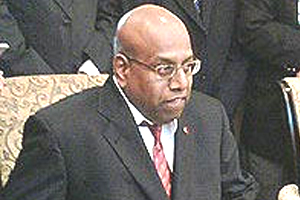-Dr. S.Ramakrishnan, January 30, 2015.
 Minimum wage was introduced by ministry of labor after they found out that about 34% of private sector employees earn less than RM700 per month which is below the poverty line of RM800. Similar study in 2010 revealed that 48% of Malaysian employees earn less than RM1000 per month. While this being the ground reality, the Malaysian government wants the country to be high income nation by 2020. This situation prompted the government to implement minimum wage to attain the high income economy.
Minimum wage was introduced by ministry of labor after they found out that about 34% of private sector employees earn less than RM700 per month which is below the poverty line of RM800. Similar study in 2010 revealed that 48% of Malaysian employees earn less than RM1000 per month. While this being the ground reality, the Malaysian government wants the country to be high income nation by 2020. This situation prompted the government to implement minimum wage to attain the high income economy.
The national minimum wages of RM900 in west Malaysia and RM800 in Sabah and Sarawak introduced in January 2013 is up for review this year. In view of the increase in prices across the board last year and the imminent increase in price due to the implementation of GST, workers deserve an increase in their minimum wages in 2015. While the MTUC wants an increase to RM1200 the Malaysian employer federation wants the old wages to remain as it is. Media report says the government would propose an increase to RM1000 to appease the employers.
Minimum wage is basic wage, excluding any allowances or other payments. But many employers like estate owners and factories have adjusted the salary scheme to include allowances and other payment to be part of minimum wage. Weak labor laws and the government issuing permits and licenses to Umno and BN cronies to bring in foreign workers have made employers addicted to foreign workers and have been discouraging the transformation to automation, self-service and high technology industries.
The presence of foreign workers both legal and illegal estimated to number about 6 million has suppressed and stagnated the wages. Malaysian government took the easy route of attracting FDIs by offering low wages, unorganized work force and poorly skilled labor. The elitist BN government has amended laws to curb workers from unionizing and deprive them of their legal rights. Workers’ rights have deteriorated as only 6.44% of the 12.4 million private sector workers are unionized.
Minister in PM’s office Abdul Wahid Omar says government is looking into gradually increasing the ratio of wages to gross domestic product (GDP) from 33.6% to 40% in the long term. Government lacks new thinking and political will on transformation into higher value chain. In other countries like Singapore wages to GDP ratio is about 43%, Taiwan 46.2%, South Korea about 43.7%, Norway 51.3%, Australia 48.7% and Japan 51.9%. While others have moved up, Malaysia remained stagnated in low wages by allowing Umno cronies to reap the profit by recruiting foreign workers in droves.
To quote a 2005 figure, for every ringgit earned in Malaysia employees get 28 cents, company 67 cents and government 5 cents unlike in Singapore employees get 42 cents, company 47 cents and government 11 cents. Workers in Malaysia are short changed by the government itself. Unless it is redressed the vision of high income economy in 2020 will remain elusive. Malaysia needs more political will and creative ideas to implement policies that will bring about structural changes in policy  implementation than mere slogan chanting and scoring political points.
implementation than mere slogan chanting and scoring political points.
Malaysian workers deserve the MTUC proposed increase of RM1200 minimum wage and employers have the capacity to pay the extra RM300. Extra spending by workers will help the economy too. It is low wage earners who support the very government who keep wages down. Malaysian workers are disorganized by race, religion and partisan politics and this is conveniently used by the ruling party to suppress wages. The ball is in the workers court.
























